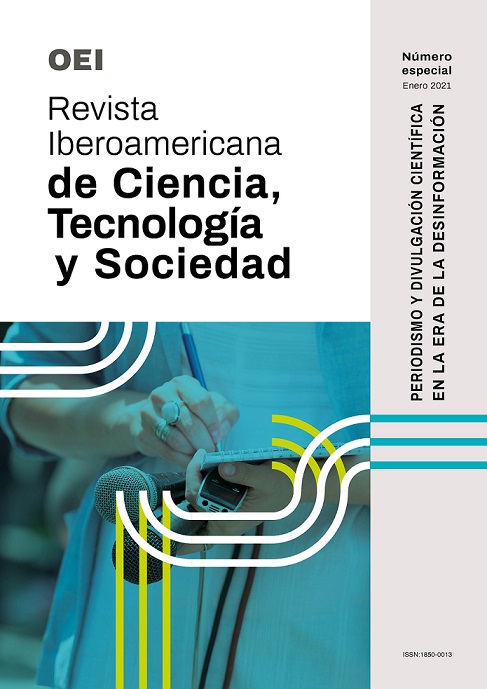The Infodemic and its Scope on the Psycho-Emotional Area of Families. A Contribution to the Covid-19 Health Crisis
Keywords:
infodemic, disinformation, psycho-emotions, mental health, Covid-19Abstract
This paper aims at analyzing the concept of “infodemic” (or informational epidemic) through the definition given by the World Health Organization (WHO) in relation to the effects generated by the informative treatment of the Covid-19 pandemic, that is: an overabundance of uncontrolled information that affects the mental balance of families. The method used in this paper is documentary and hermeneutical: scientific articles, texts and informative portals were compiled, triangulated and systematized into three categories. It is necessary to promote access to scientific knowledge to all those who contribute to science and public policies, and to all citizens in general, so that they are well informed and able to avoid the damage to mental health provoked by the perception of threat that the coronavirus has brought to their lives. This damage expresses itself in emotions of fear and sadness that increase the chances of contracting diseases, falling into isolation and accelerating the risk of death. For different reasons, within the family group, the elderly and the children are the ones who have the greatest difficulties in coping with the tension and anxiety caused by the informative treatment of the pandemic.Downloads
References
ARANTÓN, L. (2008): Criterios de Fiabilidad de la Información. Disponible en: https://dialnet.unirioja.es/servlet/articulo?codigo=4610141. Consultado el 31 de marzo de 2020.
OSLEGO, J. (2005): “Engineering social trust. What can communities and institutions do?”, Harvard International Review, vol. 27, pp. 28-31.
BROOKS, S., WEBSTER, R., SMITH, L., WOODLAND, L., WESSELY, S. y GREENBERG, N. (2020): The psychological impact of quarantine and how to reduce it: a quick review of the evidence. Disponible en: https://doi.org/10.1016/S0140-6736(20)30460-8. Consultado el 6 de marzo de 2020.
CANO-VINDEL, A. y MIGUEL-TOBAL, J. (2001): “Emociones y salud”, Ansiedad y Estrés, vol. 7, pp. 111-121.
COLOMER, E. (1990): El pensamiento alemán de Kant a Heidegger, Vol 3: El postidealismo: Kierkegaars, Feuerbach, Max, Nietzsche, Dilthey, Husserl, Scheler, Heidegger, Barcelona, Herder.
GALOSI, C y FUENTEALBA, N. (2019): “Características generales de los virus”, en M. Larsen y N. Stanchi (coords.): Patogenicidad microbiana en medicina veterinaria, Volumen Virología, pp. 6-27.
GARFIN, D, SILVER, R y HOLMAN, E. (2020): El nuevo brote de coronavirus (COVID-2019): amplificación de las consecuencias para la salud pública por exposición a los medios. Salud psicológica. Disponible en: https://doi.org/10.1037/hea0000875. Consultado el 7 de julio de 2020.
GARFIN, D., SILVER, R. y HOLMAN, E. (2020): El brote del nuevo coronavirus (COVID-2019): amplificación de las consecuencias para la salud pública por exposición a los medios. Disponible en: http://dx.doi.org/10.1037/hea0000875. Consultado el 9 de julio de 2020.
GONZÁLEZ, S. (2005): Manual de investigación documental, México, Trillas.
INNERATY, D. (2020): Pandemocracia. Una filosofía de la crisis del coronavirus, Barcelona, Galaxia Gutenberg.
LEWICKI, R., MCALLISTER, D. y BIES, R. (1998): “Trust and distrust: new relationships and realities”, Academy of Management, vol. 23, pp. 438 -458.
LOSADA, A., MÁRQUEZ-GONZÁLEZ, M., PEÑACOBA, C., GALLAGHER-THOMPSON, D. y KNIGHT, B. G. (2007): “Reflexiones en torno a la atención de los cuidadores informales de personas con demencia y propuesta de una intervención interdisciplinar. Psicología Conductual”, Revista de Psicología Clínica y de la Salud, vol. 15, nº 1, pp. 57-76.
MAGALLON, R. (2018): Leyes fake news, Madrid, Fundación Telefónica.
MARTÍN-BARBERO, J. (2012): “¿Desde dónde pensamos la comunicación hoy?”. Revista Latinoamericana de Comunicación, nº 128, abril-julio, pp. 13-29.
MENDIZÁBAL, N. (2006): “Los componentes del diseño flexible en la investigación cualitativa”, en I. Vasilachis (coord.): Estrategias de investigación cualitativa, Barcelona- España, Gedisa, pp. 65- 105.
MILLER, A. y MITAMURA, T. (2003): “Are surveys on trust trustworthy?”, Social Psychology Quarterly, vol. 66, pp. 62-70.
PLUTCHIK, R. (1980): Emotion: a psychoevolutionary synthesis, Nueva York, Harper and Row.
RIORDA, M. (2006): Hacia un modelo de comunicación gubernamental para el consenso, Buenos Aires, La Crujía.
YAMAGISHI, T. (2001): “Trust as a form of social intelligence”, Trust in Society, Nueva York, Russell Sage Foundation, pp. 121-147.
Downloads
Published
How to Cite
Issue
Section
License
All CTS's issues and academic articles are under a CC-BY license.
Since 2007, CTS has provided open and free access to all its contents, including the complete archive of its quarterly edition and the different products presented in its electronic platform. This decision is based on the belief that offering free access to published materials helps to build a greater and better exchange of knowledge.
In turn, for the quarterly edition, CTS allows institutional and thematic repositories, as well as personal web pages, to self-archive articles in their post-print or editorial version, immediately after the publication of the final version of each issue and under the condition that a link to the original source will be incorporated into the self-archive.











